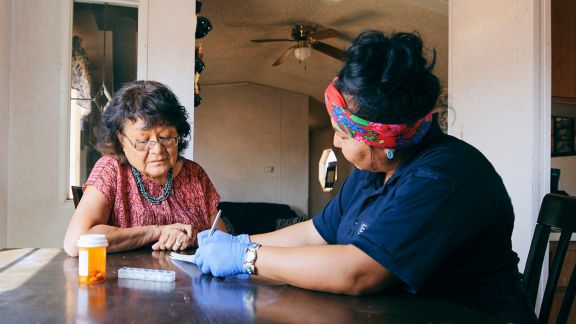Chandria Jones

Chandria's work focuses on understanding social and environmental factors that influence health outcomes and access to services, particularly among youth and families with lower incomes and persons with mental health and substance use challenges. She conducts research and evaluation in behavioral health, homelessness, obesity, and health communications. Chandria applies a rigorous, data-driven approach to evaluating programs, organizations, and policies, ensuring that research findings are contextually relevant and actionable. She specializes in participatory and community-engaged methods, leveraging multiple perspectives to strengthen the impact of health and social service initiatives. Her work emphasizes the importance of understanding complex social, cultural, and historical factors that shape health and well-being.
Currently, she serves as the project director for a Robert Wood Johnson Foundation project to promote systemic change in healthcare and public health through learning and evaluation approaches. Previously, she was the project director for a CDC-funded evaluation of strategies to improve healthcare access and outcomes and the principal investigator for a HRSA Special Projects of National Significance (SPNS) Initiative focused on implementing evidence-informed behavioral health models to improve HIV health outcomes. In this role, she led a comprehensive, mixed-method, multisite evaluation that included technical assistance to demonstration sites and dissemination of findings.
Before joining NORC, Chandria was a senior study director at Westat, where she led research and evaluations for federal agencies and foundations. She previously served as principal investigator for a national outcome evaluation for the Annie E. Casey Foundation and as Project Manager for the Children’s Mental Health Initiative National Evaluation at the Substance Abuse and Mental Health Services Administration (SAMHSA). Across her work, she applies a systems perspective to examine the environments in which individuals live, work, and receive services.
Quick Links
Education
PhD
University of Maryland, College Park
MPH
Florida International University
BS
Texas A&M University
Appointments & Affiliations
Lecturer
University of Maryland, School of Public Health
Alumna
Leaders in Equitable Evaluation and Diversity Program
Member
Advancing Culturally-responsive and Equitable (ACE) Evaluation Network
Project Contributions
Publications
-
“The Filmmaker-Participant Relationship Unwrapped.”
Project Report | November 14, 2024
-
The Filmmaker-Participant Relationship Unpacked:AppendixThe Filmmaker-Participant Relationship Unpacked: Appendix
Project Report | November 14, 2024
-
“Culturally Responsive and Equitable Data Parties: A Method for Participatory Analysis”
Project Report | July 1, 2023
-
"Engaging Communities of Color in Examining Tobacco Industry Narratives on the Proposed Menthol Ban"
Presentation | April 24, 2023
-
"Prioritizing Flexibility, Human Connection, and Representation"
Journal Article | September 30, 2022
-
"Harnessing the Power of Social Media and Leveraging Community Voice"
Presentation | June 29, 2022
-
opens in new tab"Personal Religiosity and Adolescent Females’ Characterizations of Healthy Dating Dynamics."
Journal Article | August 19, 2020
-
opens in new tab"Friends or Strangers?: A Feasibility Study of an Innovative Focus Group Methodology."
Journal Article | January 6, 2018










